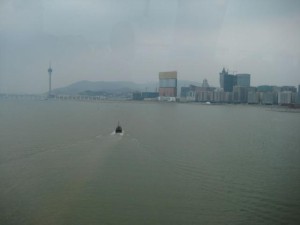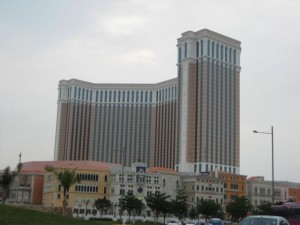Sat 13 Oct 2007
Portugal + China = Excellence
Posted by Derek under Macau
No Comments
As discussed in a prior post, Macau was a Portuguese colony for almost 450 years, only becoming a semi-autonomous part of China in 1999. During this time, the Portuguese left an obvious mark on Macau. We took a taxi from our hotel to Largo do Senado, a square in the heart of the historic district. The Portuguese influence is immediately seen in the architecture of the beautiful buildings and churches surrounding the square. We then meandered through the narrow streets of Macau passing many shops and restaurants.Â
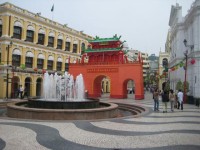
We walked by several shops where employees were passing out free samples of some unknown meat product. I have an unblemished record spanning over 30 years of never saying no to a free sample (whether from a Chinese restaurant in the mall or some old lady at Kroger or Costco), and I definitely wasn’t going to end my potentially Guinness-breaking accomplishment simply because I had no clue what was being offered.
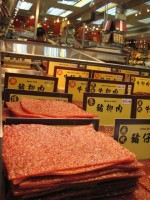
I held out my hand and the young lady used her scissors to cut a piece of foreign meat from a rectangular “meat sheet”. Within seconds of consuming my morsel, I was overwhelmed with the need to have more…NOW. Without shame, I begged for another sample of the meat (which I believe was pork). Realizing that 2 pieces was not enough, I broke down and bought a piece of the meat sheet. The incredible taste is hard to describe; it’s most akin to jerky, but infinitely better. I quickly swore that I would make it my lifelong mission to re-create the meat sheet in my own kitchen once we return to the States so Americans can share in the joy the meat sheet provides.
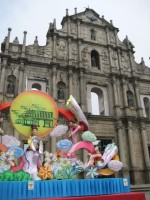
After having my fill, we continued our walk until we reached the ruins of the church of St. Paul’s. The church, which was built in 1602 by Japanese Christians who fled persecution in Japan, burned down in the mid-1800s. All that remains is the facade of the cathedral and the crypt underneath (where bones of Japanese martyrs are displayed). It is an eerie, yet beautiful reminder of the Christian religion that thrived here during the Portuguese era. Some say it is the greatest monument to Christianity in all of Asia.
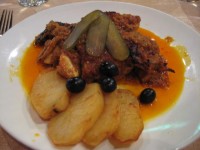
After getting lost and receiving directions from some very helpful Macanese locals, we found Restaurante Litoral – a well-known Macanese restaurant here in Macau. We trusted our guidebook and ordered the African Chicken (chicken that is slowly cooked in a sauce that is a blend of chilies, garlic, coconut and other spices) and Baked Salted Codfish (a Portuguese speciality that is still loved in Macau). If you’re a chef, try to find recipes for both of these dishes and put them on your menu. They will both be bestsellers. I can’t confirm this (but I’m fairly positive) that I saw a tear of joy in Shanna’s left eye as she tasted the salty goodness of the codfish. I can usually trust her to share a good portion of her meal, but there was no chance today. This was one of the best meals we’ve had on our trip.
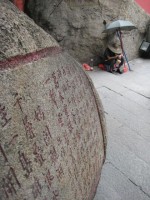
Finally, we visited the A’Ma temple. The temple was built on the site that A’Ma, a legendary woman who survived a terrible storm while on a ship, landed and then ascended into heaven. The temple, which is built on the side of a hill, was filled with Chinese tourists offering money and incense to the shrines at the temple dedicated to various gods (including A’Ma, the goddess of seafarers). It was an interesting site and a great way to end our visit to Macau.
